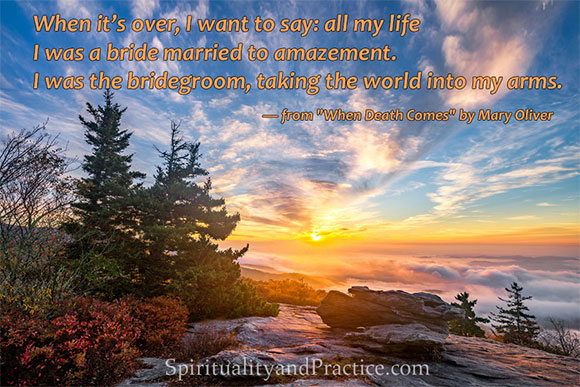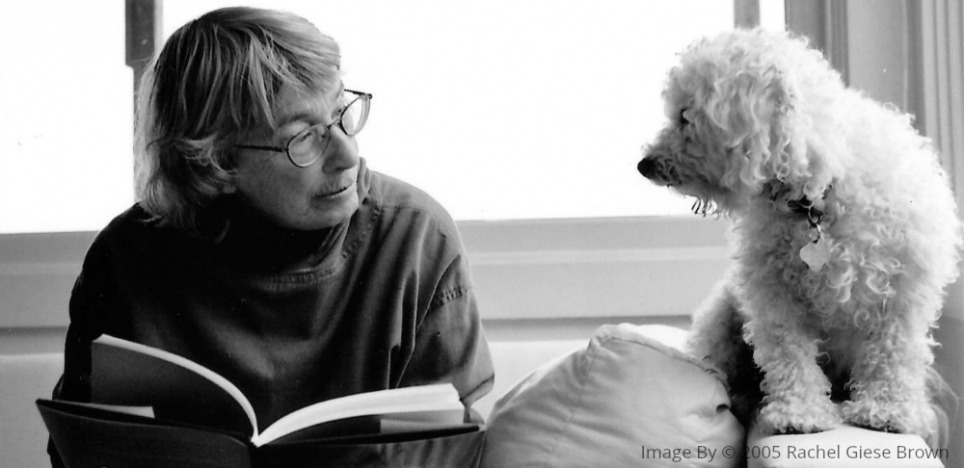"Once, years ago, I emerged from the woods in the early morning at the end of a walk and — it was the most casual of moments — as I stepped from under the trees into the mild, pouring-down sunlight I experienced a sudden impact, a seizure of happiness," wrote beloved bard Mary Oliver in Long Life: Essays and Other Writings. Her words seem as fitting a tribute as anyone could offer upon learning of that she changed worlds on January 17, 2019, at age 83. She continues:
"It was not the drowning sort of happiness, rather the floating sort. I made no struggle toward it; it was given. Time seemed to vanish. Urgency vanished. Any important difference between myself and all other things vanished. I knew that I belonged to the world, and felt comfortably my own containment in the totality. I did not feel that I understood any mystery, not at all; rather that I could be happy and feel blessed within the perplexity — the summer morning, its gentleness, the sense of the great work being done though the grass where I stood scarcely trembled. As I say, it was the most casual of moments, not mystical as the word is usually meant, for there was no vision, or anything extraordinary at all, but only a sudden awareness of the citizenry of all things within one world: leaves, dust, thrushes and finches, men and women. And yet it was a moment I have never forgotten, and upon which I have based many decisions in the years since."
Time and time again Mary Oliver has invited us into this blessing within perplexity, and it is safe to say that she may never be forgotten in this world of roses and creeks, strawberry moons and black snakes, humpback whales and kookaburras. In her honor, here's a sampling of the ways she touched our hearts and inspired in us reverence for nature and each other.
- In Red Bird, she reflects on the greatest gift which holds her in thrall.
- In Felicity, she stills her soul to discover a deep, patient, and grateful love.
- In Upstream, she notes that for her "the door to the woods is the door to the temple."
- In Dog Songs, she remembers Luke, a dog who would appreciatively touch her wet nose to flower petals.
- In Blue Iris, she regales us with "what ifs" that open our imagination to the bounties of nature.
- In Swan, she reminds us that "the leaf has a song in it."
- In New and Selected Poems: Volume Two, she finds blessing in a bee — and all it brings with it.
- In Thirst, she shares that she has given away many things, with the exception of prayers.
- In Twelve Moons, she offers these images of transformation:
Mary Oliver's words resonate not only in the settings of her poems and essays but also as stand-alone quotes:
"No poem is about one of us, or some of us, but is about all of us. It is part of a long document about the species. Every poem is about my life but also it is about your life, and a hundred thousand lives to come. That one person wrote it is not nearly so important or so interesting as that it pertains to us all."
— in Blue Pastures
"That's the big question, the one the world throws at you every morning. 'Here you are, alive. Would you like to make a comment?' "
— in Long Life
"When I am among the trees,
especially the willows and the honey locust,
equally the beech, the oaks and the pines,
they give off such hints of gladness.
I would almost say that they save me, and daily."
— in Thirst
"Every day I walk out into the world
to be dazzled, then to be reflective."
— in Owls and Other Fantasies
"My work is loving the world."
— in Thirst
So often we absorb Mary Oliver's words straight from the page or screen. How refreshing also to hear her voice:
While we may have tears about Mary Oliver's departure, she had already in her courageous way, faced right into it. So we say farewell with this poem of hers from Evidence:
"May I never not be frisky,
May I never not be risque.
"May my ashes, when you have them, friend,
and give them to the ocean,
"leap in the froth of the waves,
still loving movement,
"still ready, beyond all else,
to dance for the world."

